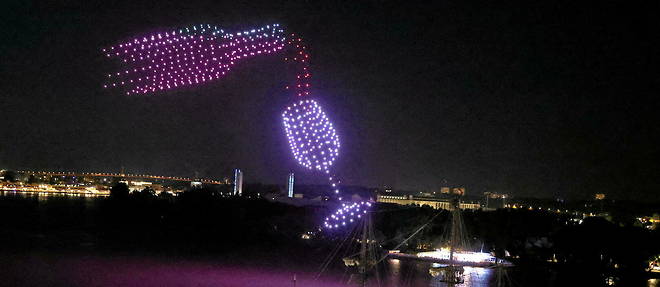Whether rescue, military, photography or just for hobby: the drone is everywhere. For a little less than ten years, these small flying machines have been used in France in the field of entertainment. Recently, several cities have replaced the traditional July 14 fireworks with a drone show, such as Nîmes and La-Teste-de-Buch, where the risk of fire, considered too high, does not guarantee the use of pyrotechnics safe. But that’s not the only reason that makes these veritable aerial ballets attractive.
One of the advantages of drones is their adaptability. On June 23 and 24, Bordeaux opted for this solution for “Bordeaux celebrates wine”: offering a new but also more personalized experience. The Bordeaux company Dronisos, a pioneer in the field in France, was thus able to prepare a show of about twenty minutes illustrating the great symbols of the city and the art of wine.
���� In Bordeaux, during the famous wine festival, more than 400 drones lit up the sky. �� This is the biggest drone show ever in the city! ��pic.twitter.com/xCxMbxOgnm
Although fireworks are a dream for young and old, the ecological impact is not great: the deposits of particles released during combustion are sometimes found kilometers from the launch area. Ditto for noise and light flashes that can disturb the local fauna and flora, not to mention the risk of fire. Drones have the advantage of being reusable, with their batteries that can last more than 100 cycles, in addition to not making (too much) noise. More eco-friendly, they keep the “magical” side to which fireworks have accustomed us.
The fireworks of July 14 cost on average, in Paris, 600,000 euros, including payroll. A drone show is much less expensive, “indoor drone shows start at 20,000 euros, and outdoor shows […] at 50,000 euros”, according to the Dronisos website.

